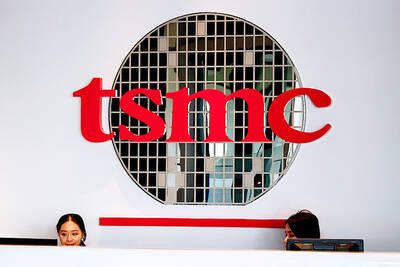Asustek Computer Inc (華碩), the world’s fifth-largest PC brand, yesterday reported net profits that grew 15 percent quarter-on-quarter to NT$5.69 billion (US$187.81 million) in the final quarter of last year, driven by strong sales of Transformer Book T100 detachable notebooks.
However, those net profits reflect a 3 percent year-on-year decline.
For the whole of last year, Asustek’s net profit dropped 4 percent to NT$21.45 billion, from a record-high of NT$22.42 billion in 2012.
The full-year net profit result beat Yuanta Securities’ (元大證券) estimate of NT$21.38 billion and Fubon Securities Co’s (富邦證券) forecast of NT$20.77 billion.
“Based on reports from our sales channels, market demand for Transformer Book T100s remains strong in almost every regional market. We expect the growth momentum to continue this year, helping us secure our No. 3 ranking in the global tablet market,” Asustek chief executive officer Jerry Shen (沈振來) told an investors’ conference yesterday.
The company is preparing to launch a new detachable notebook product, called the Transformer Book T200, next quarter, Shen said.
It aims to sell 2 million to 4 million units of its Transformer Book products this year, boosting total notebook shipments to between 20 million and 24 million units, from 18.8 million units last year, he added.
“To counteract weakening demand for traditional PCs, Asustek this year will focus on its smartphone business and plans to initiate marketing campaigns to strengthen its foothold in this highly competitive market,” Shen said.
Asustek plans to start selling its new mid-end smartphone products, dubbed ZenFones, in emerging markets like China from April, chief financial officer David Chang (張偉明) told investors.
In June, Asustek will launch a smartphone model called the ZenFone X, with AT&T Inc, the US’ largest telecom operator, “which is expected to help drive Asustek’s smartphone shipments this year,” Chang said.
Fubon analyst Arthur Liao (廖顯毅) said Asustek’s smartphone business is likely to break even this year, after losing up to NT$1 billion last year, if the company achieves its shipment target of 5 million units.
With Samsung Electronics Co and Sony Corp giving up their desktop and laptop businesses, Asustek is expected to expand its share of the PC market this year, becoming the world’s third-largest PC brand behind Lenovo Group Ltd (聯想) and Hewlett-Packard Co (HP), Liao said.
By the end of next quarter, Asustek will launch two Chromebook models, codenamed C200 and C300, in the US, Shen said.
Sales of Chromebooks will account for less than 10 percent of Asustek’s total sales this year, as the new product will largely attract school consumers rather than the mass market, he said.

Chizuko Kimura has become the first female sushi chef in the world to win a Michelin star, fulfilling a promise she made to her dying husband to continue his legacy. The 54-year-old Japanese chef regained the Michelin star her late husband, Shunei Kimura, won three years ago for their Sushi Shunei restaurant in Paris. For Shunei Kimura, the star was a dream come true. However, the joy was short-lived. He died from cancer just three months later in June 2022. He was 65. The following year, the restaurant in the heart of Montmartre lost its star rating. Chizuko Kimura insisted that the new star is still down

While China’s leaders use their economic and political might to fight US President Donald Trump’s trade war “to the end,” its army of social media soldiers are embarking on a more humorous campaign online. Trump’s tariff blitz has seen Washington and Beijing impose eye-watering duties on imports from the other, fanning a standoff between the economic superpowers that has sparked global recession fears and sent markets into a tailspin. Trump says his policy is a response to years of being “ripped off” by other countries and aims to bring manufacturing to the US, forcing companies to employ US workers. However, China’s online warriors

Taiwan Semiconductor Manufacturing Co (TSMC, 台積電) listed the challenges of ensuring export control compliance by its customers, months after the company’s artificial intelligence (AI) silicon was found to have flowed to US-sanctioned Huawei Technologies Co (華為) via intermediaries. “TSMC’s role in the semiconductor supply chain inherently limits its visibility and information available to it regarding the downstream use or user of final products that incorporate semiconductors manufactured by it,” the Hsinchu-based company said in its latest annual report released on Friday. The world’s largest contract chipmaker said the constraint impedes its ability to prevent unintended end-uses of its semiconductors, as well

Application-specific integrated circuit designer Faraday Technology Corp (智原) yesterday said that although revenue this quarter would decline 30 percent from last quarter, it retained its full-year forecast of revenue growth of 100 percent. The company attributed the quarterly drop to a slowdown in customers’ production of chips using Faraday’s advanced packaging technology. The company is still confident about its revenue growth this year, given its strong “design-win” — or the projects it won to help customers design their chips, Faraday president Steve Wang (王國雍) told an online earnings conference. “The design-win this year is better than we expected. We believe we will win